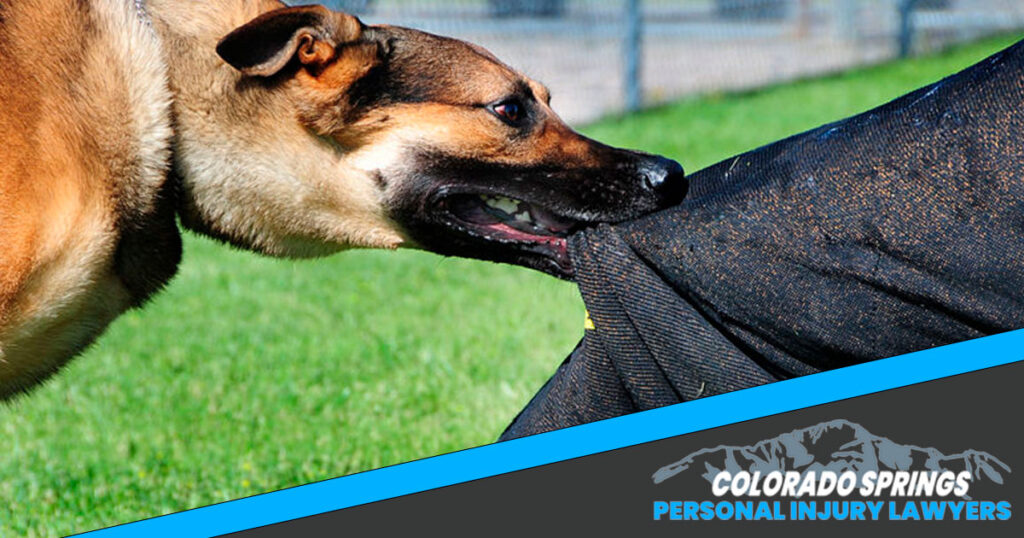A dog bite is always a traumatic event. In Colorado Springs, contacting the police or animal control immediately after such an incident is crucial. This decision can significantly affect how the situation is managed and whether you can bring a civil claim.
Calling the right authorities ensures that the dog bite is handled efficiently and appropriately. Understanding the roles of both the police and animal control in Colorado Springs can help you make an informed decision. This blog will clarify the responsibilities of each and guide you on when to involve them, ensuring that your response is both timely and effective.
Additionally, knowing who to contact can also impact your ability to seek compensation for your injuries. Getting the right legal guidance is essential to securing a settlement for medical bills, pain and suffering, and other damages. By contacting the appropriate authorities and working with a knowledgeable Colorado Springs dog bite attorney, you can navigate the aftermath of a dog bite more effectively and protect your rights.
With our expert guidance, you’ll clearly understand who to contact in different scenarios, how to manage the incident properly, and how to ensure you receive the compensation you deserve for your injuries.
Understanding Dog Bites in Colorado Springs
According to Colorado Revised Statute 25-4-603, any bite from a domestic animal that breaks the skin must be reported to the local animal control agency within 12 hours of the incident. This statute mandates that all animals involved in such bites be placed under a 10-day quarantine to monitor for rabies, regardless of their vaccination history. This precaution is essential due to the potential risk of rabies transmission.
Colorado Dog Bite Laws
Colorado has strict liability laws regarding dog bites. This means that a dog owner is responsible for injuries their dog causes, regardless of the dog’s past behavior or the owner’s knowledge of any aggression. Victims can seek compensation for medical bills, pain, and emotional suffering.
Dangerous Dog Directory
Colorado Springs maintains a dangerous dog directory to track dogs involved in biting incidents. This directory helps prevent future attacks by identifying and monitoring dangerous animals. It plays a fundamental role in public safety and ensures that necessary precautions are taken to protect residents from repeat offenders.
Should I Call the Police or Animal Control for a Dog Bite?
Contacting both the police and animal control after a dog bite in Colorado Springs is essential. Here’s why:
Addressing a Dangerous Dog: By reporting the incident, you ensure that the authorities take necessary actions to prevent future attacks.
Accessing Vaccine Records: Law enforcement can quickly obtain the dog’s vaccination history, which is essential for your health and safety.
Thorough Investigation: A report from the police or animal control includes a detailed investigation, which is valuable for your civil claim. Identifying the dog’s owner can be challenging, but the authorities can help locate them, allowing you to file a homeowners or renters insurance claim for compensation.
Potential Criminal Case: Reporting the bite could lead to a criminal case, which might assist you in getting restitution.
In Colorado Springs, many residents have homeowners insurance without exceptions for dog bites, ensuring you can seek compensation for your injuries.
Differences between police and animal control responsibilities:
Police: Handle serious injuries, public safety concerns, or potential criminal activity.
Animal Control: Manage reports of dog bites, quarantine procedures, and dangerous dog investigations.
Benefits of Calling 911:
Addressing Severe Injuries: Immediate medical attention for severe injuries sustained during the dog bite incident.
Managing Immediate Threats: Swift response if the dog is still aggressive or poses a continuing danger to public safety.
Handling Criminal Situations: Involvement of law enforcement if the incident has criminal elements, such as the dog being used as a weapon.
Remember: If you or a loved one is bitten by a dog and the injury is severe, call 911 immediately.
Steps to Take After a Dog Bite Incident
1. Seek Immediate Medical Attention
Getting medical attention after a dog bite is crucial. Even if injuries seem minor, they can become serious without proper care. Infections are common with animal bites.
2. Documenting the Incident
To ensure you have all the necessary details for reporting purposes:
Photograph Injuries: Take clear pictures of all wounds.
Gather Witness Information: Collect the names and contact details of anyone who saw the incident.
Describe the Dog: Note the breed, size, color, and any distinctive features.
Owner Information: Get the name and address of the dog’s owner if possible.
Incident Details: Write down what happened, including the location, date, and time.
3. Reporting Process
Understanding the process of reporting a dog bite is essential:
Contact Colorado Springs Animal Protection to file a report.
Provide all collected information (dog description, owner’s details).
Keep copies of all documents for your records.
Proper documentation helps support potential legal actions or insurance claims. This ensures that your case is handled effectively and that you receive appropriate compensation if needed.
What Happens After Reporting?
Once you report the dog bite, several actions are initiated to ensure public safety and proper handling of the situation.
Quarantine for Rabies Monitoring
The dog involved will typically be placed in quarantine for rabies monitoring. This process is essential for public health safety as it ensures that the animal is not carrying rabies, which could pose further health risks.
Duration: The quarantine period usually lasts 10 days.
Location: Quarantine can occur at the owner’s home or a designated facility.
Importance of Documentation
Proper documentation is crucial in legal cases and for compensation and public safety after a dog bite. It substantiates claims, eases legal processes, and supports insurance claims.
Key documents include medical records, witness statements, police reports, and photographs. They verify events and context, with police reports providing official accounts.
Collecting these documents ensures concrete evidence for legal actions or insurance claims and helps document dangerous animals for public safety.
Legal Rights and Compensation After a Dog Bite
Victims’ Rights Under Colorado Law
In Colorado, dog bite victims have specific rights for protection and compensation:
Medical Expenses
Victims can seek compensation for all medical costs, including immediate treatment, ongoing care, and surgeries.
Legal Compensation
Victims can sue the dog owner for damages like medical bills, lost wages, pain and suffering. Dog owners are strictly liable if the victim was lawfully on the property and suffered serious injury or death.
Protection Against Dangerous Dogs
Victims can report the incident to authorities, possibly leading to the dog being quarantined or euthanized to prevent future attacks.
Information Disclosure
Victims are entitled to the dog’s health status and vaccination records to assess disease risks.
Victim’s Advocacy and Support
Support services like advocacy programs help victims navigate legal systems, access medical care, and get emotional support.
Restitution in Criminal Cases
If the dog owner is criminally negligent or they used the dog as a weapon, victims can seek restitution for financial losses and emotional distress.
Strict Liability
Colorado holds dog owners strictly liable for injuries caused by their dogs, regardless of prior behavior or knowledge of aggression.
These rights ensure victims receive proper care, compensation, and legal support. Consulting with a personal injury attorney can help victims understand their rights and seek compensation.
What Costs Can I Recover After a Dog Bite in Colorado Springs?
In Colorado Springs, if you suffer a dog bite, you can recover various costs through the dog owner’s homeowners insurance. Most homeowners insurance policies in Colorado Springs cover dog bite incidents, ensuring you can seek compensation for your injuries. Here are the types of costs you can recover:
Medical Treatment Costs: This includes emergency room visits, surgeries, medications, physical therapy, and any ongoing medical care required due to the dog bite.
Lost Wages: If the injury forces you to take time off work, you can claim compensation for lost income during your recovery period.
Pain and Suffering: Emotional distress and trauma resulting from the incident can also be compensated. This may include anxiety, depression, or other psychological impacts.
Property Damage: If personal belongings were damaged during the incident, you might recover the costs of repair or replacement.
Rehabilitation Costs: Any expenses related to physical rehabilitation or therapy to recover from the injury can be claimed.
Record all expenses and get legal help for a smoother claim. A personal injury lawyer can build a strong case, boosting your chances of full compensation.
Pursuing a Dog Bite Lawsuit: Understanding Timeframes and Finding Legal Help in Colorado
Statute of Limitations
In Colorado, the statute of limitations for filing a dog bite lawsuit is generally two years from the date of the incident. Acting promptly ensures your case remains valid.
Why Legal Action May Be Necessary
Legal action may be needed if:
The dog’s owner is uncooperative or denies responsibility.
The insurance company offers insufficient compensation.
The injury leads to significant medical bills and emotional distress.
An experienced attorney can help navigate these complexities.
Finding Legal Help
Consulting a Colorado Springs dog bite attorney who specializes in personal injury cases is essential. They:
- Understand intricate laws related to dog bites.
- Maximize compensation claims.
- Handle negotiations with insurance companies.
Why Expert Guidance from an Attorney Matters After a Dog Bite Incident
Having a Colorado Springs dog bite lawyer can be crucial. These professionals help victims by:
Navigating complex laws: Understanding Colorado’s strict liability laws and the legal requirements for a dog bite case.
Ensuring fair treatment: They deal with insurance companies to secure just compensation.
Effective procedure handling: Managing paperwork, deadlines, and court proceedings efficiently.
Specialized attorneys, like those at Colorado Springs Personal Injury Lawyers®, have the experience to handle these cases. They battle for your rights, ensuring you receive proper medical costs and emotional suffering compensation.
Call Us Now For A Free Consultation!
Reach out for personalized assistance regarding your case. At Colorado Springs Personal Injury Lawyers®, we specialize in handling personal injury matters, especially those related to canine attacks.
Our firm has a proven history of success and excellence. We understand how distressing these situations can be, both physically and emotionally. Taking action promptly ensures that your rights are protected without further delay.
Our team of skilled professionals can guide you through complex laws and negotiate with insurance companies to maximize your compensation. We provide compassionate support and have extensive resources to build a strong case. Each case is personally reviewed and a tailored plan is created to address your individual needs and goals. You can trust us to advocate for you every step of the way.
Contact us today for your free consultation to secure the support you need.
Protecting The Rights Of Colorado Springs Personal Injury Victims
Our goal is to help victims who have been seriously injured in an accident. At Colorado Springs Personal Injury Lawyers, we work aggressively to help. We have substantial experience representing injured clients and dealing with insurance companies. Our skills allow us to work strategically and maximize your financial recovery.
For more information please contact us at Colorado Springs Personal Injury Lawyers to schedule a free consultation with an attorney today.
Colorado Springs Personal Injury Lawyers
102 S Tejon St Suite 1100
Colorado Springs, CO 80903
(719) 888-4878

















